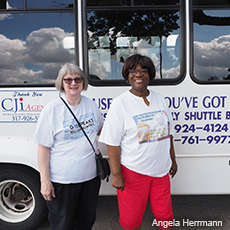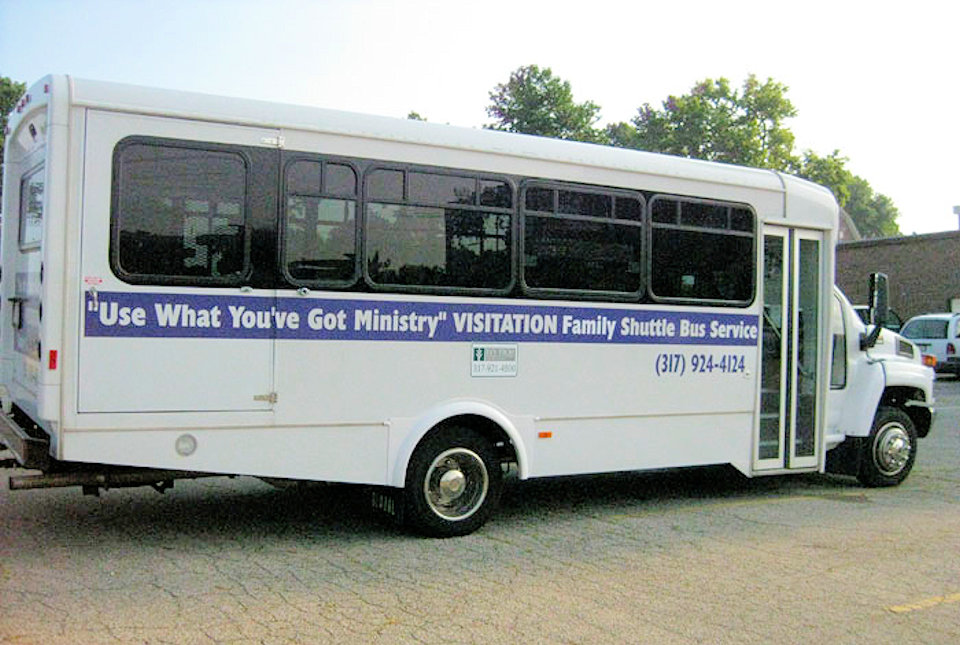United Methodist Women member Cecelia Whitfield, founder of Use What You’ve Got Prison Ministry, offers families a ride and support.
EMILY FORMAN
Side Effects Public Media
Janice McClain climbed aboard the bus at a stop in downtown Indianapolis and took a seat among a dozen or so other travelers on a recent September day. They were all women and were all on their way to visit children, spouses and fiancés in prison.
McClain has been catching a ride for more than 10 years to visit 35-year-old Edward Hobson, who goes by Pearyl. McClain calls Hobson her “knee baby,” remembering the child glued to her knee as a toddler.

Sixteen years ago, Pearyl went to prison for murder. Back then, McClain struggled to stay in contact, and her health suffered. “I mean, I passed out the day of the trial,” she recalled. “I just passed out on the floor.” She said she’s been sick ever since.
Cecelia Whitfield, owner of the bus, led the women in prayer. “The only reason I’m still here is because of prayer,” she said before she began.
The women echoed her sentiment: “Amen.”
Since 1988, Whitfield has given thousands of families rides to prisons across Indiana through her prison ministry, called Use What You’ve Got. Whitfield is a member of United Methodist Women at North United Methodist Church in Indianapolis, Indiana.
Use What You’ve Got is a bus service that helps families in Indianapolis stay connected. Research shows when people go to prison, the health of their family members at home can suffer. But many families don’t have cars or an easy way to get to prison. Whitfield’s bus tries to fill the gap.
It all started while Whitfield was visiting her son, who was incarcerated. On those trips she met many families needing rides. Several years later, she bought a school bus on layaway and painted it purple and white. Whitfield took out a mortgage on her home, and used that to pay off the bus and get insurance. She named her prison ministry after her mother’s favorite saying: Use What You’ve Got.
Now, Use What You’ve Got Prison Ministry has two 15-passenger vans. They travel to 16 prisons, plus juvenile detention centers around the state.
Janice McClain climbed aboard the bus at a stop in downtown Indianapolis and took a seat among a dozen or so other travelers on a recent September day. They were all women and were all on their way to visit children, spouses and fiancés in prison.
McClain has been catching a ride for more than 10 years to visit 35-year-old Edward Hobson, who goes by Pearyl. McClain calls Hobson her “knee baby,” remembering the child glued to her knee as a toddler.
Sixteen years ago, Pearyl went to prison for murder. Back then, McClain struggled to stay in contact, and her health suffered. “I mean, I passed out the day of the trial,” she recalled. “I just passed out on the floor.” She said she’s been sick ever since.
Cecelia Whitfield, owner of the bus, led the women in prayer. “The only reason I’m still here is because of prayer,” she said before she began.
The women echoed her sentiment: “Amen.”
Since 1988, Whitfield has given thousands of families rides to prisons across Indiana through her prison ministry, called Use What You’ve Got. Whitfield is a member of United Methodist Women at North United Methodist Church in Indianapolis, Indiana.
Use What You’ve Got is a bus service that helps families in Indianapolis stay connected. Research shows when people go to prison, the health of their family members at home can suffer. But many families don’t have cars or an easy way to get to prison. Whitfield’s bus tries to fill the gap.
It all started while Whitfield was visiting her son, who was incarcerated. On those trips she met many families needing rides. Several years later, she bought a school bus on layaway and painted it purple and white. Whitfield took out a mortgage on her home, and used that to pay off the bus and get insurance. She named her prison ministry after her mother’s favorite saying: Use What You’ve Got.
Now, Use What You’ve Got Prison Ministry has two 15-passenger vans. They travel to 16 prisons, plus juvenile detention centers around the state.
In addition to distance, there are financial barriers to staying in touch. For instance, for a fee, McClain can send Pearyl e-mails and photos. But “those things are costly to me. Especially because I’m on a fixed income,” she said.
After four years of making the grueling drive to see Pearyl, McClain’s heart broke. Literally. A major artery pumping blood from her heart ruptured. Three days later she had a stroke. She lost her ability to speak, read and write—every way of communicating with Pearyl.
“I couldn’t handle it,” she said. “The only highlight in my life basically was going to see him.”
While in rehab, McClain’s primary care physician wrote the prison, asking on McClain’s behalf to move Pearyl closer to home. The letter explained what she had been through with her health.
“She is medically unable to travel to visit him in her current health state,” the doctor wrote. Her recovery depended on seeing Pearyl. Her doctor’s words helped. The prison moved Pearyl 20 minutes away, a more manageable distance for McClain to ride. Her speech gradually returned.
A report from 2005 found, on average, adults are housed in prison more than 100 miles from their families. This makes it hard for families to visit loved ones, said Kim Gilhuly of the Human Impact Partners, a public health advocacy group focused on the health impacts of incarceration.
Her group has facilitated many focus groups with families of incarcerated people to discuss the health impacts of incarceration.
“There’s always conversation about how difficult it was to not be in touch with their loved one,” she said.
A sense of relief
These days, McClain gets a ride with Whitfield’s bus service. The families who ride chip in what they can for bus maintenance. It was Pearyl who noticed the flyer on the prison bulletin board and told her about it.
Once they arrived at the prison, McClain had waited in her socks, holding a styrofoam bowl full of quarters for a vending machine lunch with Pearyl.
Women ahead of her in line struggled to get through the metal detector. “Is there underwire in your bra?” a guard asked. Another guard offered a staple remover to the woman setting off the metal detector. She headed to the bathroom to try and cut the metal out of her bra. McClain had removed the wiring in hers at home.
Two hours later, McClain returned to the bus with a photo. Pearyl’s arms are wrapped around McClain, her beige shirt matching Pearyl’s beige uniform.
“Any anxiety I may have had yesterday or last week or whatever, all of that is just gone. You know, I feel a sense of relief,” she said.
She and Pearyl talk on the phone since her speech returned, but seeing her child comforts her.
“I’m just really ecstatic, you know, because I’ve seen my baby,” she said.
~ Reprinted with permission from November 2018 issue of Response Magazine, official publication of United Methodist Women. Emily Forman is a health reporter for WFYI Public Radio, TV and News in Indianapolis, IN. This story was produced by Side Effects Public Media, a reporting collaborative focused on public health. Republished with permission: sideeffectspublicmedia.org/post/grassroots-bus-service-brings-healing-touch-inmates-and-families. Learn more about Whitfield’s ministry at usewhatyouvegotministry.org.
Last Updated on September 21, 2022

